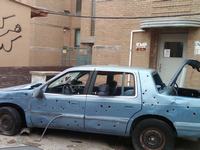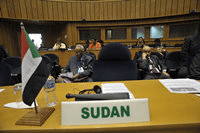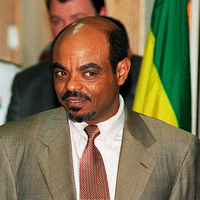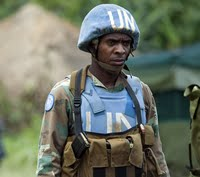In news out of Zimbabwe, the country’s finance minister, who is also the opposition MDC party’s secretary-general, escaped unharmed from a car crash involving a truck. You’ll recall that last year, opposition leader and Prime Minister Morgan Tsvangirai was involved in a similar accident that took the life of his wife. Tsvangirai walked away with minor injuries. The news here is the timing of the accident, which comes on the heels of a visit by South African President Jacob Zuma, newly invested in mediation efforts to implement Zimbabwe’s long-stalled power-sharing government. I’ve followed some of Zuma’s interventions in the Off-the-Radar […]
Africa Archive
Free Newsletter
The news cycle from Africa is usually predictable, with isolated sparks of individual and community hope amid a heavy dose of despair caused by socio-economic depravity, political squabbles and violence. Last week’s coverage would not have been any different, had it not been for the announcement that the African Union had imposed sanctions on Madagascar’s rulers. The sanctions mark the first time the regional organization has ever invoked such an instrument, despite a plethora of more-brutal regimes on the continent deserving such punishment. The AU’s Peace and Security Council was not necessarily wrong to impose targeted sanctions on Madagascan President […]

For close to a decade now I’ve been roaming the world, delivering in Johnny Appleseed fashion a message that I refined just after 9/11 for the secretary of defense’s Office of Force Transformation: The world’s core powers must develop a systemic approach to postwar and post-disaster coalition interventions inside what I call the “Non-Integrated Gap,” by which I mean those countries and regions least connected to globalization. This vision encompasses the so-called “whole of government” approach, but extends it vigorously to also include the private sector, based on the knowledge that jobs are the only exit strategy. In short, when […]
South African authorities have accelerated plans to enact legislation targeting human trafficking activities ahead of the upcoming FIFA World Cup in June and July, amid warnings from rights advocates that trafficking incidents will rise before and during the competition. Justice Minister Jeff Radebe submitted the Prevention and Combating of Trafficking in Persons bill to parliament this week, according to Reuters. The law would combine various pieces of existing legislation, compelling Internet providers to report suspicious activity and empowering South African courts with extra-territorial jurisdiction to pursue perpetrators. Radebe expects the new law to come into effect within a month. The […]

NAIROBI, Kenya — If you ask John Duku, South Sudan’s outgoing envoy to crucial ally and neighbor, Kenya, the upcoming elections in Sudan are all but irrelevant to the future of Africa’s largest country. The election represents the country’s first multiparty ballot in 24 years, but for Duku, its outcome is a forgone conclusion and its fairness is already in question. Nonetheless, the April polls just might loosen the grip that President Omar al-Bashir’s National Congress Party has held on power through two civil wars and a series of internal skirmishes over the past two decades. The election comes at […]
I’ve written before about what happens when sporting events and international relations collide. This morning, I ran across two articles that examine what might best be described as the underbelly of the global sports-industrial complex. One, in Der Spiegel, takes a look at the mixed impact that global demand for soccer balls has on the hand-stitchers of a Pakistani village that produces 40 million of them a year. That number goes up to 60 million during World Cup years. The other, by IRIN via AllAfrica.com, discusses an Ethiopian government report that found that human traffickers are using promises of a […]
The most recent outburst of violence in Nigeria’s city of Jos calls attention to mounting sectarian instability in the absence of a credible, stable government. Though clashes between Muslim and Christian groups in Nigeria have long been a problem, President Umaru Yar’Adua’s disappearance from his leadership role following illness has left Africa’s most populous nation vulnerable to larger scale violence.

NAIROBI, Kenya — It’s easy to confuse the interior of Nairobi’s Habesha restaurant with a lost corner of Ethiopia. The smell of frankincense and thick, dark coffee waft through the air as the latest tunes by Teddy Afro vie to be heard over the Amharic-language patter of denizens from Addis Ababa, Lalibela, Mekele and Gonder. There’s a good reason for the resemblance: Many of Habesha’s clients are in exile for speaking out against the government of Ethiopian Prime Minister Meles Zenawi. And if the 2005 elections as well as this year’s campaign season are any indication, it might be even […]
Time is almost up on a 2005 comprehensive peace agreement in Sudan that slated this to be the year for a referendum on South Sudan’s independence. International Crisis Group Africa Analyst Zach Vertin says that though one of the aims of the original agreement was to make unity between the North and South attractive, that effort has failed and South Sudanese will most likely vote in favor of secession from Khartoum. Key issues such as demarcation of the North/South border, wealth sharing and a timely referendum will be the focus of this democratic process unfolding in Sudan, Vertin says.

In the U.K.’s House of Lords on Feb. 3, members of parliament debated expanding Great Britain’s aid to the Democratic Republic of Congo, the site of several intersecting security and humanitarian crises. “Some 5 million people have died there since 1998,” said Lord David Alton of Liverpool. “It is the most deadly conflict since World War II.” Alton based his figure for Congolese war deaths on a widely cited 2008 report from the International Rescue Committee, which claimed that 5.4 million Congolese had died of war-related causes between 1998 and 2007. The causes included starvation, disease and combat between government […]
